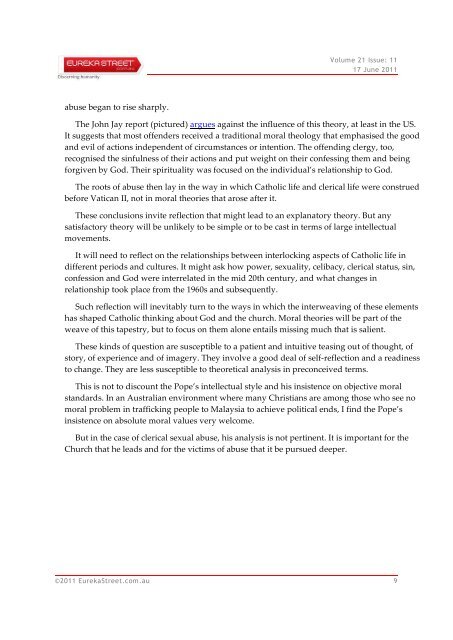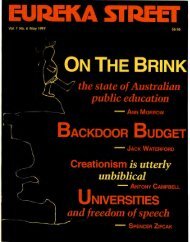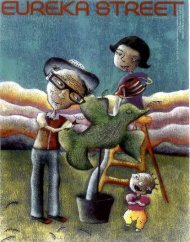17 June 2011 Volume: 21 Issue: 11 Australia's ... - Eureka Street
17 June 2011 Volume: 21 Issue: 11 Australia's ... - Eureka Street
17 June 2011 Volume: 21 Issue: 11 Australia's ... - Eureka Street
You also want an ePaper? Increase the reach of your titles
YUMPU automatically turns print PDFs into web optimized ePapers that Google loves.
<strong>Volume</strong> <strong>21</strong> <strong>Issue</strong>: <strong>11</strong><strong>17</strong> <strong>June</strong> <strong>20<strong>11</strong></strong>abuse began to rise sharply.The John Jay report (pictured) argues against the influence of this theory, at least in the US.It suggests that most offenders received a traditional moral theology that emphasised the goodand evil of actions independent of circumstances or intention. The offending clergy, too,recognised the sinfulness of their actions and put weight on their confessing them and beingforgiven by God. Their spirituality was focused on the individual’s relationship to God.The roots of abuse then lay in the way in which Catholic life and clerical life were construedbefore Vatican II, not in moral theories that arose after it.These conclusions invite reflection that might lead to an explanatory theory. But anysatisfactory theory will be unlikely to be simple or to be cast in terms of large intellectualmovements.It will need to reflect on the relationships between interlocking aspects of Catholic life indifferent periods and cultures. It might ask how power, sexuality, celibacy, clerical status, sin,confession and God were interrelated in the mid 20th century, and what changes inrelationship took place from the 1960s and subsequently.Such reflection will inevitably turn to the ways in which the interweaving of these elementshas shaped Catholic thinking about God and the church. Moral theories will be part of theweave of this tapestry, but to focus on them alone entails missing much that is salient.These kinds of question are susceptible to a patient and intuitive teasing out of thought, ofstory, of experience and of imagery. They involve a good deal of self-reflection and a readinessto change. They are less susceptible to theoretical analysis in preconceived terms.This is not to discount the Pope’s intellectual style and his insistence on objective moralstandards. In an Australian environment where many Christians are among those who see nomoral problem in trafficking people to Malaysia to achieve political ends, I find the Pope’sinsistence on absolute moral values very welcome.But in the case of clerical sexual abuse, his analysis is not pertinent. It is important for theChurch that he leads and for the victims of abuse that it be pursued deeper.©<strong>20<strong>11</strong></strong> <strong>Eureka</strong><strong>Street</strong>.com.au 9
















